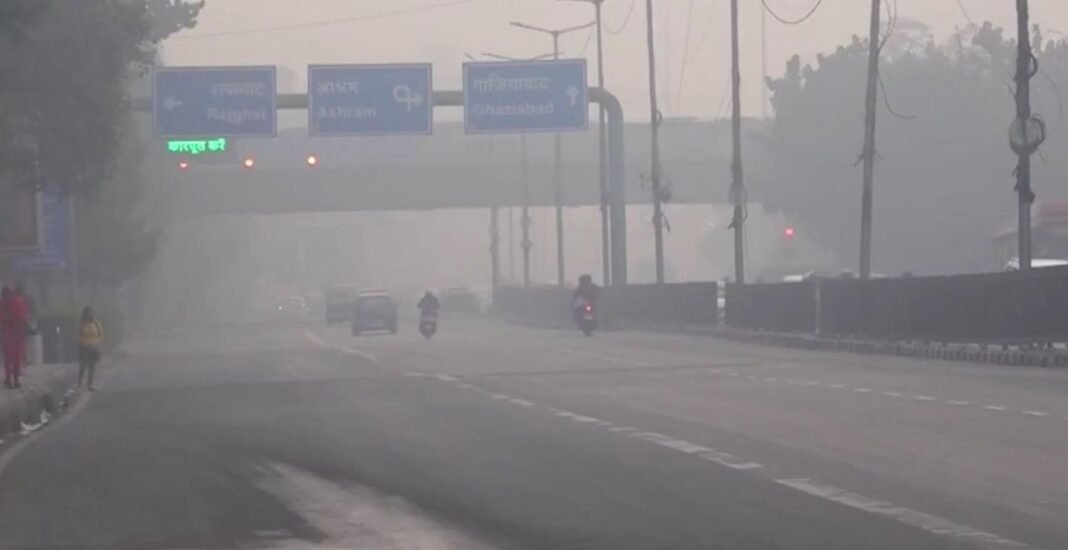Severe Pollution Triggers GRAP-4 Severe+ in Delhi NCR
New Delhi: Delhi’s air quality plunged into the GRAP-4 Severe+ category late Monday, forcing the Commission for Air Quality Management (CAQM) to enforce Stage IV of the Graded Response Action Plan (GRAP) across the National Capital Region (NCR). The decision followed a steep spike in pollution levels, with Delhi’s Air Quality Index (AQI) breaching the 400-mark amid stagnant winds and adverse meteorological conditions.
VIDEO | GRAP Stage 4 curbs invoked in Delhi as air quality turns ‘severe’. Morning visuals from ITO area.#DelhiPollution #DelhiWeather
(Full video available on PTI Videos – https://t.co/n147TvrpG7) pic.twitter.com/UhISP2RFrP
— Press Trust of India (@PTI_News) December 17, 2024
#WATCH | Delhi Police check vehicles to ensure the proper implementation of Stage-IV of the Graded Response Action Plan (GRAP) which enforces a ban on the operation of Delhi-registered BS-IV and below diesel-operated medium goods vehicles (MGVs) and heavy goods vehicles (HGVs),… pic.twitter.com/jMr7dUNpqw
— ANI (@ANI) December 16, 2024
The move comes just hours after Stage III restrictions were imposed earlier in the day when the AQI hovered over 300. However, the worsening situation necessitated emergency intervention.
Emergency Meeting Leads to GRAP-4 Implementation
In a late evening statement, CAQM highlighted the critical deterioration in air quality. “Considering the steep rise in the AQI of Delhi owing to highly unfavourable meteorological conditions and absolute calm wind conditions, the CAQM Sub-Committee called for an emergency meeting,” the panel said.
Following deliberations, the Sub-Committee imposed GRAP-4 measures with immediate effect, aiming to mitigate the hazardous air quality.
What the GRAP-4 Restrictions Entail
Under GRAP-4, stringent measures have been implemented across Delhi-NCR:
- Vehicle Restrictions:
- Ban on the movement of BS-IV diesel and BS-III petrol vehicles across the NCR.
- Entry of trucks carrying non-essential goods into Delhi is completely prohibited.
- Construction and Demolition Ban:
- A complete ban on construction and demolition activities, including public infrastructure projects like roads, flyovers, and highways.
- School Operations:
- Schools in Noida will operate in a hybrid mode with a delayed start at 9 AM due to the combined impact of severe pollution and cold weather.
- The government may consider discontinuing physical classes for Grades VI-IX and XI.
- Workplace Policies:
- State governments have been advised to implement work-from-home policies for 50% of staff in public and private offices.
- Additional Emergency Measures:
- Authorities may impose the odd-even rule for vehicle movement.
- Closure of colleges and non-essential commercial activities could also be considered.
The CAQM has issued a health advisory urging children, the elderly, and individuals with chronic conditions such as respiratory, cardiovascular, or cerebrovascular diseases to avoid outdoor activities and remain indoors.
A Recurring Crisis
Delhi’s annual air pollution crisis has become a grim routine, with factors like crop burning, vehicular emissions, and construction activities exacerbating the problem. Over the past few weeks, the Supreme Court has held multiple hearings to address the issue.
A bench led by Justice Abhay S. Oka and Justice Augustine George Masih has criticized authorities for failing to enforce regulations effectively. The court expressed dissatisfaction over continued non-essential construction and the movement of trucks carrying non-essential goods during GRAP-IV restrictions.
Additionally, the court has scrutinized the Delhi government and CAQM for delayed responses when the AQI crossed the critical 300-mark.
Public Health Concerns
Medical professionals have repeatedly highlighted the adverse health impacts of prolonged exposure to severe air pollution. Residents of Delhi-NCR, especially children and the elderly, are at heightened risk of respiratory and cardiovascular complications.
In response, the Delhi government and civic bodies are implementing short-term measures such as deploying mist sprayers on electric poles and increasing the frequency of water sprinkling on roads. However, critics argue that these interventions remain insufficient to address the scale of the problem.
The Need for Long-Term Solutions
The reimposition of GRAP-4 restrictions underscores the urgency of combating Delhi’s worsening air quality. While immediate measures like vehicle bans and construction halts offer temporary relief, long-term solutions—ranging from cleaner energy policies to robust public transport infrastructure—are critical to breaking this annual cycle of toxic air.
With judicial oversight and increasing public awareness, the onus is on authorities to prioritize sustainable solutions that safeguard both the environment and public health.
As the capital battles yet another air quality emergency, residents hope for meaningful actions that extend beyond short-term curbs, ensuring a cleaner and healthier future for the region.
See Also:
OpenAI Whistleblower, Suchir Balaji, Found Dead in US
How Much Prize Money Did Gukesh Win
86 Indians Killed or Attacked Abroad in 2023
Police Summon Wife of Atul Subhash in Suicide Investigation
——————————————————————————-
It would mean the world to us if you follow us on Twitter, Instagram and Facebook. At Newscazt, we strive to bring you the latest news and stories from India, World, Business, Sports, Entertainment and more. Our team of experienced journalists and writers are committed to delivering accurate and unbiased news and analysis.




